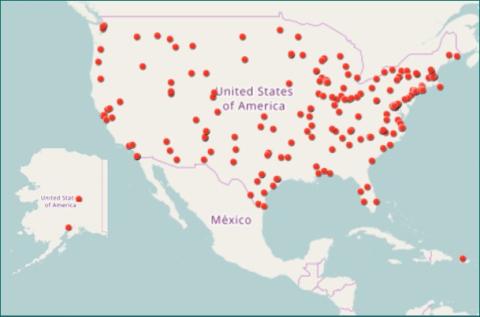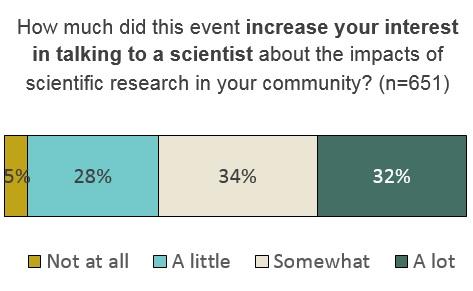The Multi-Site Public Engagement with Science (“Building with Biology”) project began in the fall of 2014, and through collaborative partnerships with scientists a kit of Building with Biology hands-on activities and public dialogue programs were created and disseminated to nearly 200 sites across the U.S. to help recipients incorporate public engagement with science activities about synthetic biology into their educational programming. While the initial project introduced new content (synthetic biology) and new, sometimes unfamiliar, practices (dialogue programs) into a wide variety of organizations, and with the upcoming publication of the National Academy of Science report Human Genome Editing: Science, Ethics, and Governance, the time is right to address this controversial topic through the development of a forum program supported by evaluation from over 40 host sites who hosted a Building with Biology forum in 2016.
Through a competitive application process, 20 sites will be selected to receive physical materials to host a forum on human genome editing in the summer of 2018. Selected sites will received a small financial stipend to support the planning and implementation of a forum, as well as have the opportunity to participate in this forum at the Museum of Science in Boston. Eligibility requirements and the application process will be announced in the coming months and like the Building with Biology Kit, the new forum and its supporting materials will also be made available online for free digital download.
Building with Biology 2016 events took place across the U.S.
Throughout the summer of 2016, nearly 200 institutions, which included science centers and museums, universities, iGEM Teams, Teen Science Café sites and other informal science education settings, hosted Building with Biology events, of which over 40 of these sites also hosted Building with Biology forum conversations. See the full list of Building with Biology kit recipients here
Host sites worked with our partners at the American Association for the Advancement of Science (AAAS) and with NISE Net Regional Hub Leaders to recruit and orient scientist volunteers who alongside informal science educators facilitated hands-on activities and engaged in multi-directional conversations with the public about synthetic biology during Building with Biology events and forums. It’s exciting to learn that many of you continue to regularly use the hands-on activities and forum materials in ongoing programming and public outreach.
Project evaluation findings
The Evaluation team collected a wide variety of data through interviews and pre- and post-event surveys with host sites; interviews and post-surveys with volunteers; and surveys with public event visitors and forum participants from across the U.S. Several high-level findings are summarized below
Summative evaluation findings about the project’s impact on professionals show that participation in the project built on informal educators’ existing experience with public engagement with science (PES), including increased knowledge or confidence in planning and organizing a PES event; training volunteers in PES approaches; and understanding the benefits of PES. Event hosts also reported better understandings of synthetic biology and improved confidence talking about the social and ethical implications of synthetic biology with public audiences.
Scientists who facilitated hands-on activities and forums reported better understandings of synthetic biology and its social and ethical implications. Scientists also reported improved confidence in communicating with public audiences, an area where many had limited prior experience. Some clearly learned the characteristics and importance of PES through the project, including one facilitator who stated,
“This project made me realize that there's a lot more value in two-way conversations than straightforward lectures. In order to engage the public, it's necessary to involve them, rather than just try to impress them.”
Others seemed less aware of PES as a discrete concept, but still identified important characteristics of PES in the events they facilitated.
Forums were particularly successful in creating positive outcomes for hosts and facilitators. Forums were a new public engagement format for many informal educators. One professional shared,
“This forum event was different than our other adult programming as we were asking the visitors to talk, think and share their opinion in written form and reporting back to another party. Our previous events were lecture plus community discussion and participation but the visitor's opinion this time is shared with others. Our visitors were very pleased that they learned a lot.”
The forum format was also new for facilitators. By creating distinct opportunities for the public to share their ideas and scientists to listen, facilitators gained new insights on the public’s perspectives. Forum facilitators were more likely than others to say they learned from the public.
Evaluation results show positive impacts on the public, as well. Forum and hands-on activity participants reported increased interest in future activities related to PES and synthetic biology, including things like checking out news stories about synthetic biology and talking to scientists about the impacts of scientific research in their community. The figure below shows hands-on activity participants’ responses about one such topic.
Participants valued the events’ opportunities to learn, hear diverse opinions, discuss the topic of synthetic biology, and have access to experts. One participant shared, “[I valued] the opportunity to learn and discuss in a laid back, respectful environment.” Building with Biology participants reported learning about synthetic biology content knowledge and applications, but also developed an understanding of others’ opinions, the complexity of scientific issues, and the risks and benefits of science.
Building upon the project’s accomplishments and incorporation of public engagement with science activities and techniques into more informal science education settings and programming, the project team is excited to take what we’ve learned and apply that knowledge to the development of a new public dialogue program on human genome editing.
More detail about the project’s evaluation findings are provided in a recording of the Online Workshop: Findings from Data Collection about Building with Biology Events available at: https://vimeo.com/221479572.



